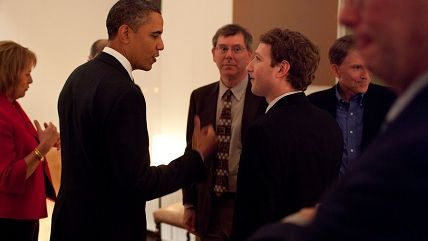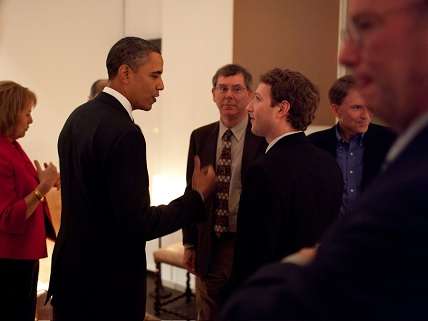Facebook Employees Wanted Trump Posts Removed as 'Hate Speech'
Social network loosening community standards for newsworthy events instead.


Some employees of Facebook argued that the social network company should remove some of Donald Trump's posts because they allegedly violated community standards about hate speech, the Wall Street Journal reported. Facebook CEO Mark Zuckerberg ultimately decided, last December, that such a move would be inappropriate, according to the Journal, which also reported that a number of employees complained about this, with those responsible for censoring content even threatening to quit.
The Journal report, based on anonymous sources, comes on the heels of a purportedly leaked internal Facebook memo from Zuckerberg, defending Peter Thiel's position on the Facebook board from "questions and concerns." Thiel, a Silicon Valley investor has come under fire for being a prominent Trump supporter.
"There are many reasons a person might support Trump that do not involve racism, sexism, xenophobia or accepting sexual assault," Zuckerberg wrote in the post. "It may be because they believe strongly in smaller government, a different tax policy, health care system, religious issues, gun rights or any other issue where he disagrees with Hillary."
"I know there are strong views on the election this year both in the US and around the world," Zuckerberg reminded employees. "We see them play out on Facebook every day."
Zuckerberg continued, explaining how diversity works: "Our community will be stronger for all our differences, not only in areas like race and gender but also in areas like political ideology and religion."
Calls to ban hate speech, from Facebook employees or anyone else, are deeply misguided. Such bans have the opposite of the intended effect, protecting the forbidden speech from critical engagement and giving it a martyr-like status. Unpopular speech is the most important speech to protect, otherwise free speech is an illusion. Facebook, a U.S.-based company that enjoys First Amendment protections, nevertheless regularly block contents around the world—honoring 20,000 such requests from 92 national governments in the first half of 2015 alone.
Earlier this year, Facebook was criticized for perceived political bias when it was revealed that the network's trending topics were curated by human editors, while on Friday Facebook announced it would be loosening its community standards for "items that people find newsworthy, significant, or important to the public interest."


Show Comments (48)